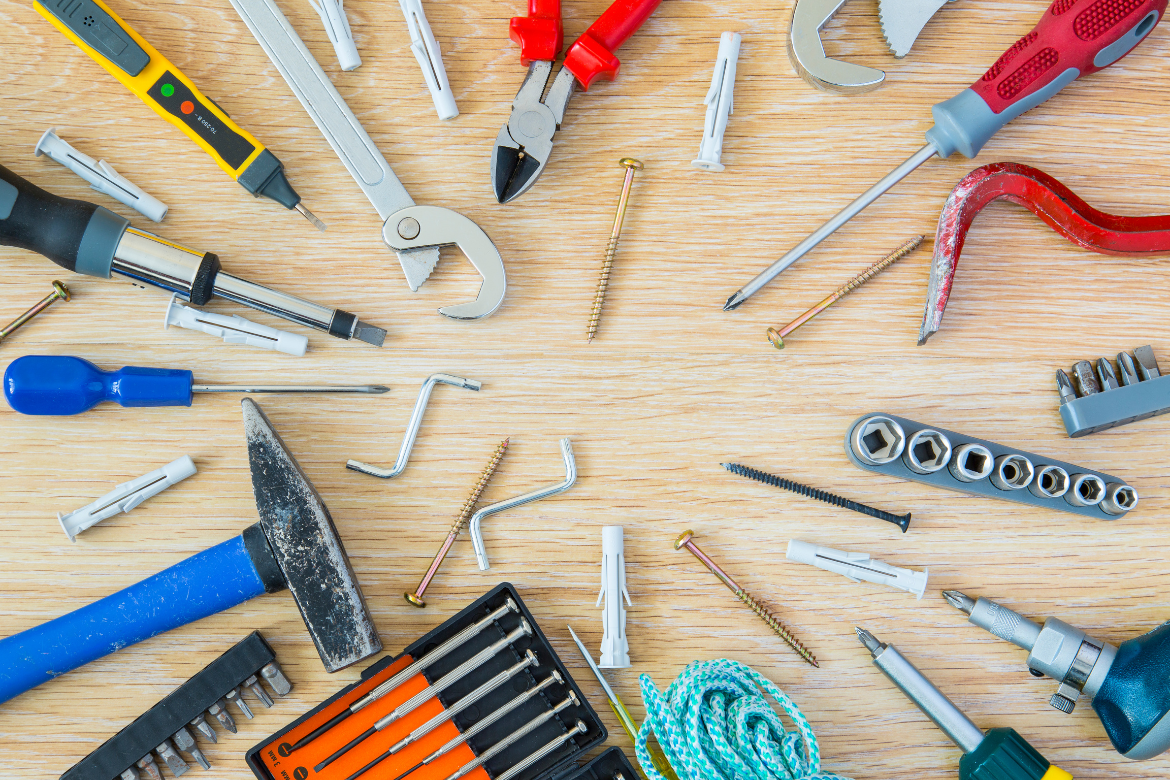10 Items to Have in Your Home Repair Toolkit
Every homeowner is probably keenly aware that basic home repair skills are a must-have, and any new homeowner will soon find out! There will always be something to do around the house, and having the tools to complete some of the basic work will not only give you a sense of accomplishment and self-sufficiency but also save you money on hiring professionals for simple jobs.
Below, we’ll discuss ten items that are essential to have in your home repair toolkit and why each is helpful.
1. Tape Measure
One of the tools you’ll find yourself reaching for most often is a tape measure, so it tops our list in terms of importance. You’ll find yourself using your tape measure for everything from hanging picture frames evenly and measuring for new furniture to more advanced repairs, like replacing door saddles and trim. A durable, 25-foot tape measure should last you for many years.
2. Multi-Bit Screwdriver
Having screwdrivers handy at all times is essential, and most homeowners keep a multi-bit screwdriver in an easy-to-access location for regular use, even if they have a full set in the garage. Multi-bit screwdrivers save space and prevent you from having to search for the right tool for things like changing light switch plates and upgrading door knobs.
3. Pliers
A good pair of pliers can be helpful for some minor DIY electrical and plumbing repairs, which many homeowners find themselves in need of frequently. These jobs, in particular, can be expensive if done by a professional. Some of the best home warranties will cover these types of repairs, but it’s still helpful to have pliers for an immediate, if temporary, DIY solution in the case of an emergency.
4. Hammer
A hammer is another tool that you’ll find yourself using for most DIY home repairs. Everything from opening and closing paint cans to reattaching window trim and installing wall decorations will make you glad to have a hammer on hand. A claw hammer is typically favored for most minor home repair solutions.
5. Stud Finder
Locating studs behind your sheetrock is crucial for when you want to hang wall decorations or when you need to cut into your walls to access electrical wiring or pipes. Most stud finders will locate the 2×4 framing in your walls, but it’s a good idea to upgrade to one that can detect non-ferrous metals, like copper. These special stud finders will help prevent cutting through wiring or cutting multiple holes in your walls if you need to reach plumbing pipes.
6. Small Level
A small, 12-inch level is a great tool to have handy for a variety of purposes. Most often, you’ll use a level to hang wall decorations, level chairs or tables with respect to your flooring, and ensure other home repairs are done properly. However, you can also use a level to test that studs or foundation walls are plumb to check for signs of structural instability.
7. Cordless Drill and Drill Bits
A cordless drill is a great tool for furniture assembly, small-scale woodworking projects, affixing decorations throughout your home, and much more. You can choose a cheap cordless drill and a simple drill bit set to keep your expenses down, or you can upgrade to a more durable drill with a large selection of drill bits for ultimate convenience and tool longevity.
8. Caulk
White silicone caulk is surprisingly useful for DIY home repair projects. These include sealing windows and doors to improve your home’s energy efficiency, waterproofing your plumbing fixtures to prevent leaking behind your walls, and more. You can even use it to seal seams around molding and trim for a more aesthetically-pleasing look.
9. Bar Clamps
A good set of bar clamps can be helpful for minor repairs on wood trim, cabinets, dressers, bed frames, and other wooden furniture. You can also use them for DIY woodworking projects, and they can be helpful for furniture assembly and other more involved repairs as well. A small set of two to three clamps should be sufficient for most homeowners, and squeeze clamps with a quick release are most useful.
10. Step Ladder
Finally, a small step ladder that can allow you to reach at least the ceiling height in your home is great for changing light bulbs, painting your ceiling, and other repairs that require a height boost. A taller step ladder can also be useful for outdoor projects, like cleaning your gutters and fixing soffit damage.








